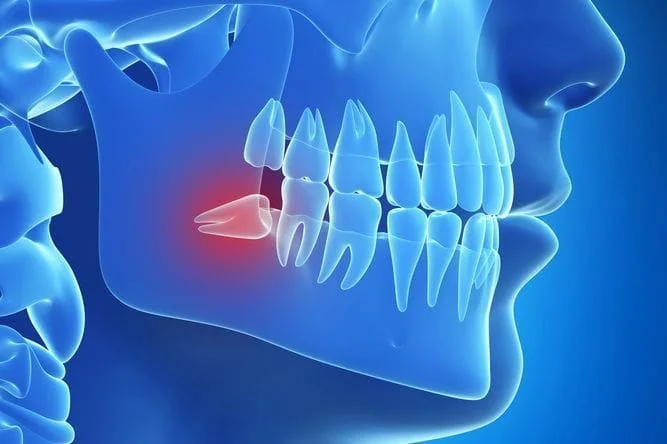Wisdom tooth removal is a common, relatively simple type of oral surgery that can have a tremendous impact on your long-term oral health. If you or your child does not have enough room for wisdom teeth, extraction can ease discomfort and inflammation. The procedure can also reduce your risk for infection, dental crowding, and related concerns. Jerrry Hancock, DMD, recognizes that, though common, wisdom tooth removal is not necessary for everyone. He will make an honest recommendation following a complete exam at his Nashville, TN, office. If you or your child do require extraction, he will make the process as easy as possible. He uses advanced technology and extremely precise surgical techniques. Furthermore, he has multiple sedation options to ensure your comfort throughout the procedure.
Impacted wisdom teeth can shift nearby teeth and cause overcrowding.
Should You Have Your Wisdom Teeth Removed?
Dr. Hancock recommends wisdom tooth extraction when there is not enough room in your mouth for these teeth to come in. In some cases, as they erupt, they can push against your other teeth, causing notable crowding. In other instances, the wisdom teeth might not be able to come in at all, or they may only be able to erupt partially. These teeth are known as “impacted” because they remain trapped under a layer of bone or gum tissue. The pocket around the tooth can easily trap bacteria, which can lead to significant inflammation and increase your risk of infection. In rare cases, a cyst or tumor could develop.
Dr. Hancock recognizes that, though common, wisdom tooth removal is not necessary for everyone. He will make an honest recommendation following a complete exam.
If you or your teen is already suffering from an impacted tooth, you will need to undergo an extraction as soon as possible. Nonetheless, Dr. Hancock prefers to take preventive measures, removing wisdom teeth before they cause a problem. That is one reason why routine exams are so important. During these biannual visits, Dr. Hancock can monitor your dental development and assess the size of your jawbone to determine the likelihood of wisdom tooth complications.
What to Expect During the Procedure
Extraction is a low-risk and fairly quick procedure. Though he uses incredibly precise, gentle techniques, Dr. Hancock also offers several types of sedation to further minimize discomfort. In addition to local anesthesia, he can provide oral or IV (intravenous) sedation. If you are particularly anxious, or you are having all four wisdom teeth removed, he can use a deeper level of sedation to induce a twilight sleep.
After you receive these medications, Dr. Hancock will create a small incision to access and remove each wisdom tooth. If your tooth is impacted, he will need to remove some gum or bone tissue to access the molar. If it is coming in at an angle, he may need to remove it in several pieces. Rest assured that, even in these more complex cases, you should feel little to nothing during your procedure. After extracting the teeth, Dr. Hancock will close up the incisions with dissolvable stitches.
Recovery and Aftercare
Following wisdom tooth extraction, you will experience some moderate inflammation and swelling. You can minimize discomfort with mild over-the-counter medications and ice packs. If needed, Dr. Hancock can prescribe additional medications, as well as antibiotics. You should eat a soft diet for a few days and avoid smoking. Discomfort will typically start to fade in just 24 hours, though it may be around three to five days before it completely resolves.
Dr. Hancock will also provide specific instructions to minimize the risk of dry socket, one of the most common complications of tooth extraction. Once a tooth is extracted, a blood clot will form in the socket. If this clot is dislodged, the nearby nerve will be exposed, causing significant discomfort. To prevent this condition, you should not use a straw until your doctor provides approval. It is also important to brush gently, stay hydrated, and avoid carbonated beverages.
Schedule a Consultation
During a complete consultation, Dr. Hancock can explain more about wisdom tooth extraction and determine whether or not you need this procedure. If you are experiencing discomfort from incoming wisdom teeth, or if you have not had an exam in some time, contact our office online today. You can also reach us at (615) 383-0132.

